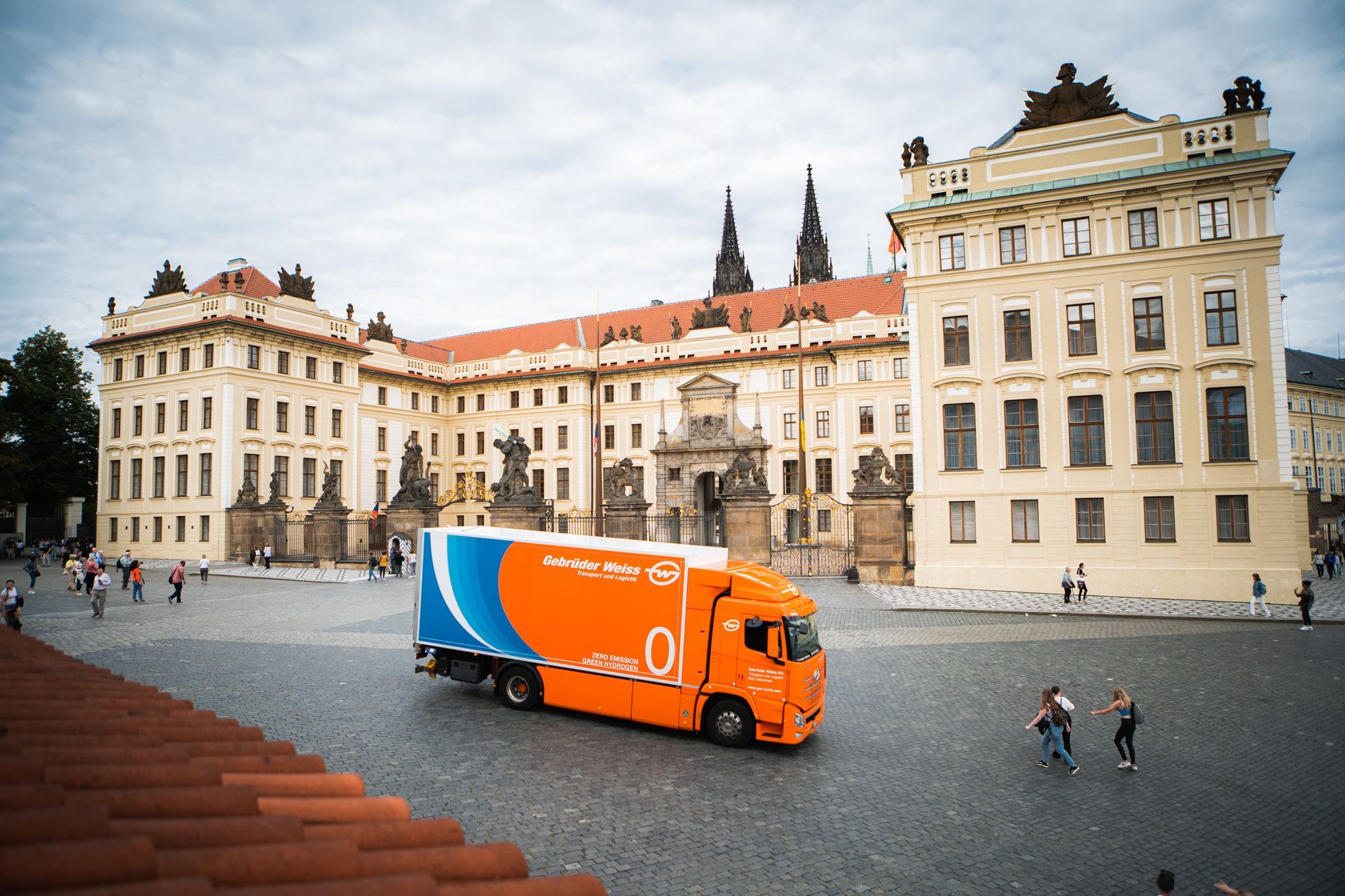While battery-powered is gaining ground in passenger cars, hydrogen looks more promising for heavier weights. Trucks and buses are launched in Japan, China and California. Switzerland is the furthest away in Europe, where an association of companies from energy to retail has met. The companies bought over 40 Hyundai hydrogen trucks, and one of them came to Prague to see.
The advantages of hydrogen as an energy carrier have long been known. Astronauts already took tanks into space in the 1960s. They were much lighter than the lead accumulators of the time and still have a significant advantage today. One kilogram of batteries in the Tesla Model 3 contains 260 Wh of energy, one kilogram of hydrogen a proverbial 33,333 Wh. Even if about 50 percent of the efficiency of electrochemical cells is subtracted, hydrogen remains a much more practical energy storage for heavy transport.
This is why China, for example, invests heavily in the use of hydrogen, which, however, derives most of it from coal, a little less from natural gas and only one percent from renewable sources. The exact opposite is the case in Switzerland, where electricity from fossil fuels accounts for 1 percent, while nuclear power provides 18 percent and dam turbines 60 percent.
This mix will start powering the first two hydrolysers with a combined power of 15 megawatts next year. The hydrogen from them will replace nine million tons of diesel per year, while the waste heat will be used to heat nearby residential areas. The government is supporting precisely these energy and infrastructure projects, and in transport, it waives the annual road tax of 60,000 francs (1.4 million crowns) for hydrogen trucks.
The private sector responded by setting up the H2 Energy Switzerland consortium, which brings together the activities of twenty companies, starting with the retail chains Coop and Spar, through the logistics companies Gebrüder Weiss and Leclerc Transport, the fuel suppliers Shell, Avia and Tamoil, and the energy company Socar.
The consortium has formed a joint venture with Hyundai. Thanks to this, 46 trucks of the Xcient Fuel Cell series, as you can see in the images, are already traveling around Switzerland. Logistics company Gebrüder Weiss brought one on display in Prague last week. He posed in various photogenic locations and took the goods to the Alza shop in Holešovice.
It is not even a coincidence, both companies work on the sustainability of logistics. They build solar power plants on the roofs of the halls, deliver with energy-efficient vehicles, Gebrüder Weiss also participates in the recycling of household appliances and batteries.
The driver’s workplace differs from the diesel version only in a few indicators, but behind the high cabin, which can hold 32 kilos of hydrogen, there are seven large pressure tanks. A 20-ton car can travel four hundred kilometers with them, refueling takes eight to twenty minutes.
In terms of technology, the hydrogen truck is an interesting piece of the puzzle. Hyundai took the electrochemical cells from the personal Nexo. One bundle has a power of 90 kilowatts, here are two. During starting and acceleration, the engine draws electricity from the battery. It is located in the frame of the frame and has a capacity of 72 kilowatt hours.
Such a large reserve allows you to make the most of regenerative braking, which plays an important role in mountainous Switzerland. And best of all, there is still enough energy available for an electric motor with a power of 350 kilowatts and a torque of 2237 Newton meters. It is followed by a six-speed automatic transmission.
It sounds complicated and it’s not cheap either. But there is no other way for such a load. We also recently drove a battery-powered Scania in Prague. It drives more efficiently, but carries a third less load, has a third shorter range, and takes four hours to charge.
Forty-six Hyundai hydrogen trucks are already in operation in Switzerland and another 27 are headed to Germany. This brand alone would like to see 1,600 in Europe by 2025. And other manufacturers such as Iveco, Volvo and Mercedes-Benz are on the way. Production of hydrogen cells will soon begin in large series, which should finally be reflected in the price of the vehicles, which are about five times more expensive than diesel.
The further away you get from the car itself, the more hazy the future appears. The price of green hydrogen in our country will probably not fall below 300 crowns per kilogram in the coming years. Consuming 80% of the orange beauty would therefore mean a fuel cost of CZK 2,400 / 100km, which is three times even that of today’s expensive diesel.
In addition, hydrolysers for the production of hydrogen are still waiting for a fundamental discount, to which photovoltaic panels have suffered. Not to mention electricity, which is consumed in the production and subsequent use of hydrogen in the vehicle about two and a half times more than when recharging the batteries. Which shows how complex the future is without fossil fuels.
–


